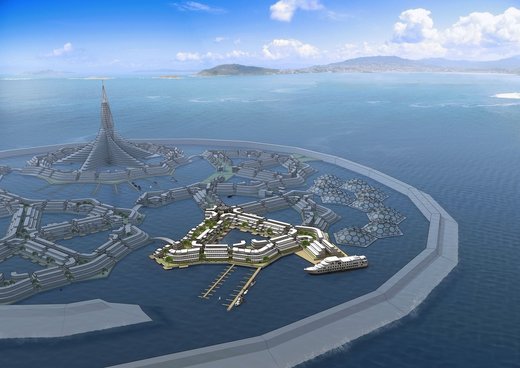22 April 2014
It’s a cool idea for the mega-rich wrapped in a bogus mantle of philanthropy, argues Rod Sweet
Stop fighting! Feed the hungry! Enrich the poor! Such are the “great moral imperatives” laid down by the Seasteading Institute – the uber reasons we should all get with their programme.
“Seasteading” is a movement promoting the idea of building sovereign city states that float on the high seas, free of the gridlock, bureaucracy and taxes that blight “normal” countries.
The working idea, provided by Dutch designers DeltaSync, is for detachable clusters of 50m x 50m platforms made of hollow concrete caissons that support apartments and offices surrounded by great floating breakwaters.
As well as meeting the moral imperatives, seasteads would in the fullness of time do another remarkable thing: they would be testbeds for “start-up governments”, allowing experimentation and competition among floating micronations.
And the great thing about this “competitive governance”, says Seasteading Institute co-founder Patri Friedman, grandson of Nobel-winning, free-market economist Milton, is that the most successful floating countries would be beacons of progress which the rest of the world will rush to copy.
Rose-tinted screensavers
This quaintly naïve proposition may be what happens when Silicon Valley types are moved to superimpose their rose-tinted screensavers onto the real world. (Friedman, born in 1976, spent time working for Google. The institute’s co-founder is PayPal’s co-founder, Peter Thiel.)
It may be just harmless wishful thinking and grist for science fiction, but there is something distinctly fishy about the institute’s claims.
How will seasteads ‘enrich the poor’, for instance? The answer is, because island start-up countries get rich quick, so that’s what will happen with seasteads, and these floating extra-territorial corporations will employ millions.
In a video narrated by the institute’s communications director, Joe Quirk, we’re given the examples of Hong Kong, Singapore and Mauritius.
“It seems every time a new island nation hits restart with new rules based on modern knowledge,” says Quirk, “the poor create their own wealth at breathtaking rates, often putting their kids straight into the professional class.”
Leaving aside the quibble that Hong Kong and Singapore are not islands, the comparison is breathtakingly simplistic. The remarkable rise of Hong Kong and Singapore was based as much on an initial phase of export-led manufacturing enabled by throngs of desperately poor, slum-dwelling residents as much as it was on their newness as states or their proximity to the sea.
As for fighting global poverty, the floating, tax-avoiding conglomerates envisioned by the Seasteading Institute may be able to hand-pick thousands of skilled blue and white-collar workers, but this will hardly cheer the billion or so estimated by the World Bank to subsist on a dollar or less a day.
Similar sleight-of-hand is evident in seasteaders’ claim that seasteads will “stop fighting”, which Quirk describes as “the most basic moral imperative”.
If you thought this meant “end war”, join the club – so did I. But it doesn’t. It means seasteading will provide an escape from the political gridlock that consumes so much energy in the United States. It will do this by allowing the super rich to go and set up states on their own. (Super rich because the costs of building open-water seasteads and protecting them from hurricanes and large waves will be prohibitive.)
When it comes to “curing the sick”, prepare for more disappointment. The inspiration Quirk offers here is not a way of providing the world’s poor with basic healthcare, but medical tourism and floating pharmaceutical companies operating outside the USA’s restrictive regulations on new medicines.
Feeding the hungry, meanwhile, is about setting up algae farms.
Blurring the lines
Listening to this stuff, the question begins to nag: why the bogus mantle of philanthropy? In part it may be because the institute asks for public donations to fund its work and pay its staff. The half million dollars donated by PayPal’s Peter Thiel when the institute was founded in 2008 must be running low by now.

Artist’s conception of a grown-up seastead with the floating breakwater necessary for the high seas (Seasteading Institute)
The answer may also lie in the nature of the seasteading business proposition. For this, we turn to an institute white paper that puts more flesh on the bones.
Apart from being able to avoid taxes and safety regulations, seasteading would let companies set up just outside the territory they want to target, say the authors.
So if the bicycle makers of a country, call it “Cycletania”, are burdened with high corporate taxes and stringent safety and quality requirements, and Cycletania’s territory stretches 12 nautical miles off its coast, a swashbuckling seasteading bicycle maker could anchor 12 nautical miles and one nautical inch away and flood the place with cheaper bikes.
This characteristic of seasteading – which may strike some as predatory – is sure to be unpopular, the authors acknowledge. (The authors are two Maxes – Max Marty and Max Borders.)
“Skepticism may come from investors, customers or from the public at large,” they write. “Indeed, skepticism may arise… from agitation by special interests and competitors benefiting from territorial rulesets (i.e. less competition).”
Dealing with this negativity will require a special sort of marketing: it may mean, they say, “that the lines between lobbying and marketing will have to blur. Because many seastead ventures could be threatening to land-based businesses trapped in constrictive rules, seasteading might require a degree of pre-emptive marketing rarely seen in everyday business.” (The emphases are mine.)
Suddenly, having read this, the misfiring platitudes about enriching the poor and all that start to make sense: it’s the lines between marketing and lobbying going blurry.
Again, on the face of it, it’s all pretty harmless. Seasteading will struggle to take off, I predict, because the supposed benefits are likely to pale compared to the risks and costs and legal uncertainties involved.
But it’s important to lay bare the motivation behind the movement – the libertarian urge for the freedom to profit without having to contribute to the social conditions that make profit possible.
Escapism and laziness are in there as well. “Why not reform existing political systems?” the institute asks itself on its FAQ page. The answer is revealing: “It is extremely difficult and costly to significantly impact political outcomes,” they write.
Well, yes it is, but the real answers to the world’s problems are far duller and more difficult than the backers of seasteading are likely to have the stomach for: negotiated settlements, enlightened governance, strong civil society and political will.
Politics is messy, boring and a blunt instrument, but it’s all we’ve got, and if we want a better world, business elites should have to muck in with their time, effort – and, yes, taxes – like the rest of us.
• Rod Sweet is editor of Global Construction Review






